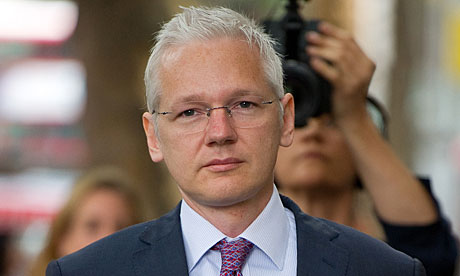Assange loses fight against extradition to Sweden
UK court gives the green light to Sweden. Assange to face sexual charges

Julian Assange, WikiLeaks founder and editor-in-chief, has lost his battle against extradition and must return to Sweden to face sexual assault charges, a British Court ruled today.
The High Court in London on Wednesday supported an earlier ruling by the a lower court in Sweden that allowed the extradition request back to Sweden to move forward. "The action of the Prosecutor has been subject to independent scrutiny by judges in Sweden, which, as judges in another Member State, we must respect,” said the President of the Queen's Bench Division, on behalf of the Court.
Assange was arrested in the UK in December of 2010, but was released shortly thereafter, under strict bail conditions. Asange’s legal team has 14 days to decide whether to launch an appeal to the Supreme Court.
Assange’s appeal was argued on the premise that the European Arrest Warrant was invalid because it had been issued by a prosecutor, not a court. The UK judges ruled that it held, because it had been under independent judicial scrutiny in Sweden, and was therefore valid.
"... even if the court was constrained to determine whether someone was an accused by solely considering the question of whether the prosecution had commenced, we would not find it difficult to hold that looking at what has taken place in Sweden that the prosecution had commenced. Although it is clear a decision has not been taken to charge him, that is because, under Swedish procedure, that decision is taken at a late stage with the trial following quickly thereafter,” the judge added.
Assange's legal team argued that under English law, the accusations made by the two women could not be considered as offences because of the way they were "worded" by the women. The two alleged victims have accused Assange of sexual molestation, unlawful coercion, and rape. But the UK court rejected the argument.
"There can be no doubt that if what Mr. Assange [is accused of doing] had been done in England and Wales, he would have been charged and thus criminal proceedings would have been commenced,"
the judgement said.
Assange’s lawyer contended that one woman's allegation of rape should be rejected because her claim was based on the fact that Assange didn't use a condom, and "using a condom, or not, the sex remained consensual," he said. The argument was rejected by the judge, as the woman alleged she was asleep during the sexual act.
"There is nothing in the statement from which it could be inferred that he reasonably expected that she would have consented to sex without a condom," the court judgement said.
"It is clear that the allegation is that he had sexual intercourse with her when she was not in a position to consent and so he could not have had any reasonable belief that she did," it added.
Finally, Assange’s legal team claimed that the arrest warrant and its demand for extradition were “disproportionate” to the charges, and that Assange had been willing to be questioned via video conference. That appeal was also dismissed.
Assange has always adamantly denied the sexual assaults and rape charges, and claims that they are politically motivated.
"I did not rape those women and cannot imagine anything that happened between us that would make them think so, except malice after the fact, a joint plan to entrap me, or a terrifying misunderstanding that was stoked up between them," he wrote in his autobiography "Julian Assange: the Unauthorised Autobiography", published in September.
"I may be a chauvinistic pig of some sort but I am no rapist, and only a distorted version of sexual politics could attempt to turn me into one," he wrote.
Assange's legal issues do not start or end with Sweden.
WikiLeaks came under fire with the U.S. authorities last summer when it published classified U.S. documents relating to the conflicts in Iraq and Afghanistan. Assange may be charged with espionage. The documents were passed on to WikiLeaks by United States Army soldier Bradley E. Manning. Manning was arrested in May 2010 in Iraq and has remained incarcerated in in Fort Leavenworth, Kansas, awaiting trial.
WikiLeaks went on to publish some 250,000 confidential U.S. diplomatic cables in late 2010, causing great embarrassment to multiple governments around the world.
Claiming great financial duress, WikiLeaks launched an appeal last week for donations, but has been forced to shut down operations due to lack of funds.
WikiLeaks has launched a fund “Sweden Versus Assange", to pay for his legal court fees.
You may read the full Judgment here, and its summary here .
(main image, Guardian U.K.)
(big image, Alia Walker)

Ane Howard
I am a social journalist covering technology innovations and the founder of RushPRNews.com, an international newswire.
All author posts